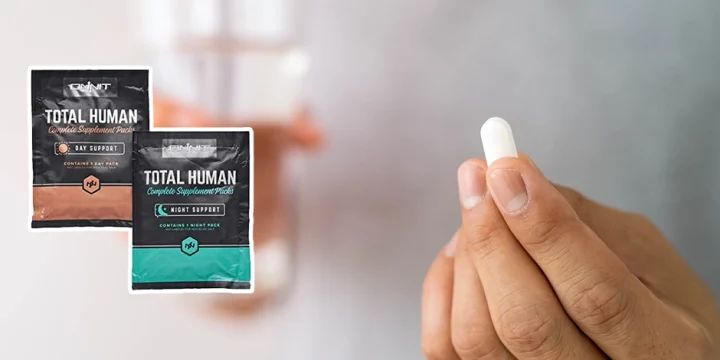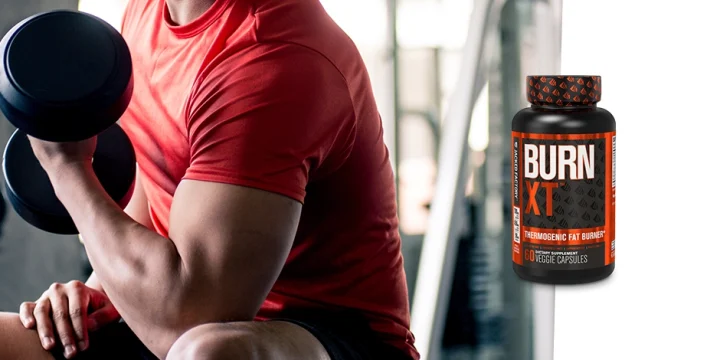It's common knowledge that quality sleep goes hand in hand with weight loss, and the lack of sleep makes you prone to gaining weight.
But does that mean that individuals with sleep apnea can reverse their fate by simply losing weight?
I gathered a team at Total Shape and sought a sleep expert's counsel for in-depth research to establish whether sleep apnea can be reversed by losing weight.
Here’s what we found.
Quick Summary
- Weight loss can significantly reduce the severity of sleep apnea, though it doesn't cure it.
- Excess weight contributes to sleep apnea by accumulating fat in the neck and abdomen, leading to obstructed airways.
- According to Harvard Medical School, losing weight equivalent to 10-15% of your body weight reduces the severity of sleep apnea.
- In my personal opinion, maintaining a healthy weight is crucial for managing sleep apnea effectively.
Can Losing Weight Cure Sleep Apnea?
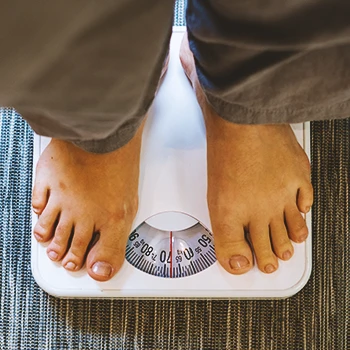
No, losing weight can’t cure sleep apnoea, but it can significantly reduce its severity. In my MMA career, I've seen firsthand how shedding pounds doesn't exactly cure sleep apnea, but it sure takes the edge off its severity.
This is especially so with obstructive sleep apnoea (OSA), a sleep disorder and the most common form of sleep apnoea [1].
With OSA, the problem starts with the fat deposits in the neck and tongue that restrict natural airflow during breathing.
Eliminating the fat deposits through weight loss can potentially treat the condition among other related health conditions, according to the American Journal of Respiratory and Critical Care Medicine [2].
More on that shortly.
Another way weight loss improves obstructive sleep apnea is by reducing abdominal fat to allow the lungs to expand when breathing [3].
According to Harvard Medical School, losing weight equivalent to 10-15% of your body weight reduces the severity of sleep apnea [4].
Remember, sleep apnea symptoms and the impact of weight loss vary by individual factors like BMI and health. Always consult a doctor before beginning a weight loss program for tailored advice and sleep apnea management.
How Does Excess Weight Affect It?
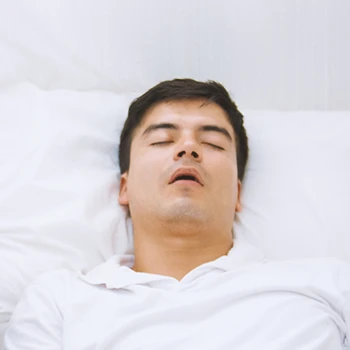
Excess weight contributes to sleep apnea by accumulating fat in the neck and abdomen, leading to obstructed airways and breathing interruptions. From my fighting days, I know too well how extra weight means more neck and belly fat, which really messes with your breathing at night.
This condition is more prevalent in obese individuals due to increased pharyngeal fat deposits [5].
In addition to overall weight loss, specific reductions in airway structures like the pterygoid and pharyngeal lateral wall have been shown to contribute to improvements in sleep apnea symptoms, emphasizing the multifaceted impact of weight loss on respiratory health.
The pharyngeal fat blocks your upper airways during sleep when the airway is relaxed. And when the airway is squeezed and forced through a restricted airway, it causes snoring — a common symptom of sleep apnoea, according to the research published in PubMed [6].
Visceral fat in the abdomen is another risk factor for sleep apnea.
The excess fat in the belly compresses the chest walls and decreases lung volume, reducing its capacity and diminishing airflow.
Other lesser common causes include enlarged tonsils, which block the airway, a large neck, narrow throat, lung diseases, heart problems, acid reflux, and endocrine disorders such as thyroid disease and diabetes [7].
Related Article: If I Lose Weight Will I Stop Snoring?
Health Effects of Sleep Apnea and Excess Weight

Sleep apnea leads to sleep deprivation and poor rest due to disordered breathing, stressing the metabolic, cardiovascular, and pulmonary systems. Dealing with sleep apnea and extra weight in the ring, I've felt the strain it puts on your body, from your metabolism to your heart.
These effects are amplified in overweight individuals, increasing the risk of lung, heart, and metabolic diseases, according to the Journal of Clinical Sleep Medicine [8].
Sleep Apnea and Cardiovascular Health
Sleep apnea causes intermittent breathing lapses during sleep, leading to fluctuating oxygen levels and triggering the body's fight or flight response.
This results in repeated blood pressure spikes and increased heart rate.
Over time, these fluctuations can cause inflammation and plaque buildup in the arteries, known as atherosclerosis, which is associated with higher risks of high blood pressure, strokes, and heart attacks [9].
The other effects of sleep apnoea on cardiovascular health include:
- The disruption of the nervous system controlling heartbeat and blood flow
- Increase in carbon dioxide and glucose levels in the blood
- An increased insulin resistance
- Altering the flow of carbon dioxide and oxygen
As a result of the above effects, sleep apnoea is also associated with certain cardiovascular conditions [10].
Here are some of them:
- Hypertension
- Atrial fibrillation
- Heart failure
- Coronary heart disease
- Stroke
- Transient ischemic attacks (commonly known as ministrokes)
- Type 2 diabetes
- Metabolic syndrome (hypertension, obesity, dyslipidemia, and diabetes)
Obesity Hypoventilation Syndrome (OHS) and Sleep Apnea

Obesity Hypoventilation Syndrome (OHS) is a combination of obesity and sleep-disordered breathing, which causes low levels of oxygen in the blood and high amounts of carbon dioxide at the same time [11].
According to the National Heart, Lung, and Blood Institute, obstructive sleep apnea is common among people with OHS. Individuals with OHS experience exerting pressure against their chest wall and lungs, which interferes with their ability to take deep breaths [12].
Experts assert that an overwhelming majority (up to 90%) of people with OHS also have sleep apnoea.
However, the reverse is not true— not everyone that suffers from OSA has OHS [13].
Additional studies on OHS have revealed a direct relation to Body Mass Index (BMI). People with a BMI greater than 50 have a higher chance of OHS than others [14].
OHS can cause an increase in carbon dioxide levels in the blood while decreasing oxygen levels.
Individuals suffering from such sleep disorders are at a high risk of contracting cardiovascular disease [15].
Among the main culprits are heart failure and high blood pressure.
Can Sleep Apnea Cause Weight Gain?

Yes, sleep apnoea can cause weight gain. When you lack a good supply of oxygen when sleeping, you risk becoming overweight. Training for the ring, I realized that bad sleep from apnea can actually lead to weight gain - it's a tough cycle to break.
Let's break it down further.
Low Energy and Chronic Fatigue
A single sleepless night can drastically reduce your energy, making daily tasks feel overwhelming.
Prolonged poor sleep can lead to chronic low energy, making it challenging to maintain a healthy lifestyle, including regular exercise, grocery shopping, and preparing nutritious meals.
This state can influence you to consume processed and unhealthy foods, ultimately leading to weight gain.
Moreover, the low energy levels cause you to sit idle for long periods during the day, not expending any additional calories, which doesn't help your situation.
Slow Metabolism

Poor sleep often results in daytime fatigue, reducing physical activity and slowing your metabolism.
This decrease in metabolic rate can lead to weight gain, even without an increase in calorie intake, according to the WebMD [16].
Hormonal Changes
The lack of quality sleep also brings about hormonal imbalance, making it nearly impossible to lose weight [17].
When you’re not sleeping enough, the body is under enough stress to disrupt hormone production.
In particular, stress disrupts the production of leptin and ghrelin, hormones responsible for sending signals to the brain when your stomach is full and empty.
Leptin, which signals the brain when the stomach is full, is inhibited, while ghrelin, which signals the brain when the belly is empty, is produced more, according to the International Journal of Molecular Sciences [18].
The result of this? Non-stop eating and a setback to your weight loss ambitions.
“Sleep apnea patients have significantly higher ghrelin levels, the hormone that makes you feel hungry, and significantly lower leptin levels, the hormone that makes you feel full,"
-Chelsea Rohrscheib, Ph.D., Lead Sleep Specialist & Neuroscientist at Wesper
Increased Cravings and Decreased Willpower
Studies point out that you’re more likely to crave foods that give you a quick energy boost when you’re tired [19].
Furthermore, feeling tired continuously decreases your willpower and makes it challenging for you to make healthy choices.
Will Treating It Aid Weight Loss?
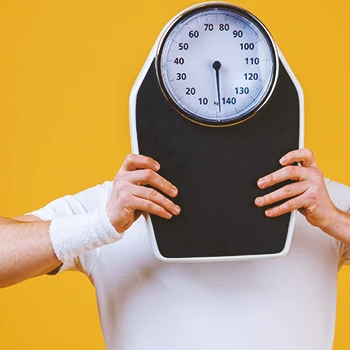
Treating sleep apnea, particularly with Continuous Positive Airway Pressure (CPAP) therapy, can facilitate weight loss. From my experience, tackling sleep apnea head-on, especially with CPAP, really helped me keep my weight in check for fights.
In studies published in PubMed, OSA patients undergoing CPAP treatment showed a notable decrease in ghrelin levels, a hormone linked to hunger, within two days, aiding in weight management [20].
Interestingly, the long-term use of CPAP, the most effective sleep apnea treatment, has also been tied to weight gain.
So, it's wise not to rely solely on CPAP as a method of weight control [21].
Other Sleep Apnea Treatment Options

Besides lifestyle changes and maintaining healthy body weight, here are a few treatments that work.
Continuous Positive Airway Pressure (CPAP)
As mentioned earlier, CPAP is the most effective treatment for sleep apnoea.
Actually, it's the first-line treatment for the same. Studies have found CPAP therapy effective in decreasing visceral fat and overall body fat in patients with severe OSA [22].
The CPAP therapy machine works to provide patients with constant air pressure to keep their airways open.
Patients who have used CPAP report positive changes, including disappearing severe sleep apnea symptoms.
For those who struggle with CPAP machines, alternative treatments for sleep apnea, including oral appliances and upper airway surgery, offer viable options, broadening the scope of effective interventions beyond weight loss and breathing devices.
Oral Appliances
Oral appliances are custom-made devices apnea patients wear on their mouths during sleep to keep their airways open.
They are designed to hold the tongue forward and reposition the jaw to avoid blocking the airways and to keep the upper airway from collapsing [23].
Mouth and Facial Muscle Therapy
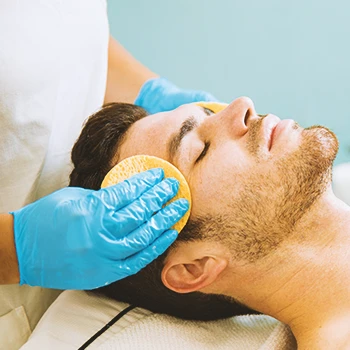
Exercises that strengthen the facial and mouth muscles (myofunctional therapy) aid in repositioning the tongue.
Studies on the same have shown positive results in improving the quality of sleep and reducing symptoms of daytime sleepiness, according to the Nature and Science of Sleep [24].
Surgical Procedures
If the above treatments don't work, the last resort is surgery.
The doctor schedules a series of surgeries, including jaw surgery, an implant, and the removal of tonsils [25].
FAQs
Does Sleep Apnea Make Weight Loss Harder
Yes, sleep apnea makes it hard to lose weight. First, you don't get enough sleep with obstructive sleep apnea because your airways are blocked, and you must constantly wake up to prevent suffocation.
This means you don't get sleep quality, which is essential to weight loss.
Does Sleep Apnea Cause Belly Fat?
Yes, sleep apnea causes belly fat accumulation but only in men.
Japanese researchers found an association between obstructive sleep apnea and visceral fat/belly fat build-up in men. However, they found no such association in women [26].
Can Dieting Help My Sleep Apnea?
Dieting can aid in reducing severe sleep apnea symptoms.
Weight loss reduces the size of your neck circumference, decreasing the pressure on your airway and making breathing easier. Eating healthy gives you the energy to exercise and lose weight.
References:
- https://www.atsjournals.org/doi/full/10.1513/pats.200708-137MG
- https://www.atsjournals.org/doi/10.1164/rccm.201903-0692OC
- https://www.ncbi.nlm.nih.gov/pmc/articles/PMC3581237/
- https://www.health.harvard.edu/blog/weight-loss-breathing-devices-still-best-for-treating-obstructive-sleep-apnea-201310026713
- https://www.msdmanuals.com/professional/pulmonary-disorders/sleep-apnea/obstructive-sleep-apnea-osa?autoredirectid=20195
- https://pubmed.ncbi.nlm.nih.gov/14713187/
- https://diabetesjournals.org/care/article/31/Supplement_2/S303/24789/Abdominal-Fat-and-Sleep-ApneaThe-chicken-or-the
- https://www.ncbi.nlm.nih.gov/pmc/articles/PMC2546461/
- https://www.nhlbi.nih.gov/health/sleep-apnea
- https://www.ninds.nih.gov/health-information/disorders/sleep-apnea
- https://pubmed.ncbi.nlm.nih.gov/30872398/
- https://www.nhlbi.nih.gov/health/obesity-hypoventilation-syndrome
- https://www.atsjournals.org/doi/10.1164/rccm.201410-1900OC
- https://jcsm.aasm.org/doi/10.5664/jcsm.2986
- https://ufhealth.org/conditions-and-treatments/obesity-hypoventilation-syndrome-ohs
- https://www.webmd.com/sleep-disorders/sleep-apnea/sleep-apnea
- https://www.ncbi.nlm.nih.gov/pmc/articles/PMC3065172/
- https://www.ncbi.nlm.nih.gov/pmc/articles/PMC8583769/
- https://www.ncbi.nlm.nih.gov/pmc/articles/PMC3763921/
- https://pubmed.ncbi.nlm.nih.gov/12952256/
- https://www.ncbi.nlm.nih.gov/pmc/articles/PMC2546451/
- https://pubmed.ncbi.nlm.nih.gov/10449691/
- https://www.ncbi.nlm.nih.gov/pmc/articles/PMC6956298/
- https://www.ncbi.nlm.nih.gov/pmc/articles/PMC6132228/
- https://www.ncbi.nlm.nih.gov/pmc/articles/PMC3480570/
- https://www.atsjournals.org/doi/abs/10.1164/ajrccm-conference.2013.187.1_MeetingAbstracts.A5937
About The Author
You May Also Like


